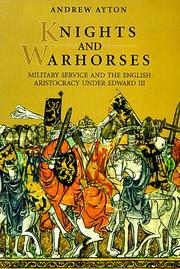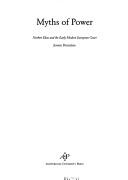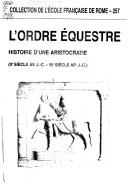| Listing 1 - 10 of 21 | << page >> |
Sort by
|
Book
ISBN: 9783799574723 3799574727 Year: 2016 Volume: 81 Publisher: Ostfildern: Thorbecke,
Abstract | Keywords | Export | Availability | Bookmark
 Loading...
Loading...Choose an application
- Reference Manager
- EndNote
- RefWorks (Direct export to RefWorks)
History of Europe --- anno 1500-1799 --- anno 1800-1899 --- Aristocracy (Social class) --- Rural population --- Hierarchies --- Order --- Agricultural population --- Farm population --- Population --- Sociology, Rural --- Aristocracy --- Aristocrats --- Upper class --- Nobility --- History
Book
ISBN: 9789004344150 9789004345348 9004344152 9004345345 Year: 2017 Volume: 10 Publisher: Boston : Brill,
Abstract | Keywords | Export | Availability | Bookmark
 Loading...
Loading...Choose an application
- Reference Manager
- EndNote
- RefWorks (Direct export to RefWorks)
Factional Struggles' explores the dynamics of conflicts among ruling elites within cities, dynastic courts, rural areas and regional noble lineages during the early modern period. Building on case studies from France, Italy, the Empire and the Swiss Confederation, the essays collected by Mathieu Caesar in this volume highlight how factions were formed and how they shaped political society from the late Middle Ages. The authors have especially focused on how political and religious ideologies contributed to the formation of partisanship, the role of propaganda, and the significance and strategies of factional leaders. The volume shows how factions, despite the generally negative view of them held by theologians and jurists, were in practice accepted and used as political tools.
History of Europe --- anno 1500-1799 --- anno 1400-1499 --- Aristocracy (Social class) --- Aristocracy (Social class). --- Elite (Social sciences) --- Elite (Social sciences). --- History --- Europe. --- Elites (Social sciences) --- Leadership --- Power (Social sciences) --- Social classes --- Social groups --- Aristocracy --- Aristocrats --- Upper class --- Nobility --- History.
Book
ISBN: 0631133917 Year: 1986 Publisher: Oxford Blackwell
Abstract | Keywords | Export | Availability | Bookmark
 Loading...
Loading...Choose an application
- Reference Manager
- EndNote
- RefWorks (Direct export to RefWorks)
History of the United Kingdom and Ireland --- Aristocracy (Social class) --- Aristocratie --- England --- Angleterre --- Nobility --- History --- Gentry --- Noblesse --- Histoire --- -Nobility --- -Noble class --- Noble families --- Nobles (Social class) --- Peerage --- Upper class --- Titles of honor and nobility --- Gentry, Landed --- Landed gentry --- Squires --- Aristocracy --- Aristocrats --- -History --- -Aristocracy --- Noble class --- History.

ISBN: 8883194608 Year: 2000 Publisher: Roma Bulzoni
Abstract | Keywords | Export | Availability | Bookmark
 Loading...
Loading...Choose an application
- Reference Manager
- EndNote
- RefWorks (Direct export to RefWorks)
Aristocracy (Social class) --- Nobility --- Papacy --- Noble class --- Noble families --- Nobles (Social class) --- Peerage --- Upper class --- Titles of honor and nobility --- Aristocracy --- Aristocrats --- History --- Rome (Italy) --- Rome (Italy : Commune) --- Rome (Italy : Governatorato) --- Rūmah (Italy) --- Roma (Italy) --- Rom (Italy) --- Rím (Italy) --- Rzym (Italy) --- Comune di Roma (Italy) --- Rome --- History of Italy --- anno 1500-1799 --- Rome (Italy : Comune)

ISBN: 0851155685 Year: 1994 Publisher: Woodbridge Boydell
Abstract | Keywords | Export | Availability | Bookmark
 Loading...
Loading...Choose an application
- Reference Manager
- EndNote
- RefWorks (Direct export to RefWorks)
Aristocracy (Social class) --- Knights and knighthood --- War horses --- Aristocracy --- Aristocrats --- Upper class --- Nobility --- Chargers (War horses) --- Horses --- Warhorses --- Cavalry --- Knighthood --- Civilization, Medieval --- Chivalry --- Heraldry --- Orders of knighthood and chivalry --- History --- War use --- Great Britain --- History, Military --- History of the United Kingdom and Ireland --- anno 1200-1499
Book
ISBN: 9783412210076 Year: 2013 Publisher: Köln Böhlau
Abstract | Keywords | Export | Availability | Bookmark
 Loading...
Loading...Choose an application
- Reference Manager
- EndNote
- RefWorks (Direct export to RefWorks)
Aristocracy (Social class) --- Nobility --- Noble class --- Noble families --- Nobles (Social class) --- Peerage --- Upper class --- Titles of honor and nobility --- Aristocracy --- Aristocrats --- History --- History of Europe --- anno 1800-1899 --- anno 1900-1909 --- anno 1910-1919 --- anno 1920-1929 --- anno 1930-1939 --- anno 1940-1949 --- Aristocracy (Social class) History. --- History. --- Aristocracy (Social class) Germany --- Germany
Multi
ISBN: 1783275936 9781783275939 9781800100961 1800100965 1800100817 Year: 2021 Publisher: Woodbridge The Boydell Press
Abstract | Keywords | Export | Availability | Bookmark
 Loading...
Loading...Choose an application
- Reference Manager
- EndNote
- RefWorks (Direct export to RefWorks)
An in-depth analysis of the key contribution made by the women members of this important ruling family in maintaining and advancing the family's political, landed, economic, social and religious interests.
Upper class women --- Aristocracy (Social class) --- Aristocracy --- Aristocrats --- Upper class --- Nobility --- Women --- History --- Ormond family. --- Great Britain --- Ireland --- Politics and government --- History. --- History of the United Kingdom and Ireland --- anno 1400-1499 --- anno 1500-1599 --- anno 1600-1699 --- 1172-1603 --- Aristocratic women. --- Ireland. --- Irish history. --- aristocracy. --- confessional interests. --- economic interests. --- historical impact. --- landed interests. --- political impact. --- politics. --- power. --- social impact. --- social roles.

ISBN: 9053561366 9053561110 Publisher: Amsterdam : Amsterdam university press,
Abstract | Keywords | Export | Availability | Bookmark
 Loading...
Loading...Choose an application
- Reference Manager
- EndNote
- RefWorks (Direct export to RefWorks)
History as a science --- Elias, Norbert --- anno 1500-1799 --- Aristocracy (Social class) --- History --- Nobility --- Von Krüdener, Jürgen --- 940.2 --- 940.2 Geschiedenis van Europa: Nieuwe en Nieuwste Tijd--(1492-heden) --- Geschiedenis van Europa: Nieuwe en Nieuwste Tijd--(1492-heden) --- Aristocracy --- Aristocrats --- Upper class --- Elias, Norbert, --- Krüdener, Jürgen. --- Elías, N. --- Europe --- Council of Europe countries --- Eastern Hemisphere --- Eurasia --- Court and courtiers --- History. --- POUVOIR POLITIQUE --- VIE SOCIALE --- MONARCHIE --- CIVILISATION --- EUROPE --- COUR ET COURTISANS --- CONCEPTIONS --- CONCEPTION --- 17E-18E SIECLES --- 16E-18E SIECLES
Book
ISSN: 12552364 ISBN: 9782753552593 2753552592 2753585016 Year: 2017 Publisher: Rennes: Presses universitaires de Rennes,
Abstract | Keywords | Export | Availability | Bookmark
 Loading...
Loading...Choose an application
- Reference Manager
- EndNote
- RefWorks (Direct export to RefWorks)
"Noblesse oblige." La maxime du duc Pierre-Marc-Gaston de Lévis (1764-1830) est passée dans le langage courant pour évoquer les obligations morales qui pèsent sur les détenteurs d'un nom, et plus généralement pour inviter tous les prétendants à la respectabilité à adopter un comportement conforme à la dignité qu'ils revendiquent. L'idée n'était pas nouvelle. En 1665, dans son Dom Juan, Molière plaçait déjà dans la bouche de Dom Louis une tirade véhémente devenue fameuse : "Non, non, la naissance n'est rien où la vertu n'est pas." Si la noblesse reposait sur la vertu, quelle définition donnait-on à cette qualité ? S'agissait-il du courage guerrier, de l'exemplarité morale ou de l'appartenance au monde des gens de bien ? Vivre de ses rentes ne suffisait plus pour être reconnu comme noble dans une société où, à partir du XVIIe siècle, le roi s'imposa comme le maître des identités. Sous une unité de façade, quelles failles économiques, culturelles et idéologiques traversaient la noblesse à l'époque moderne ? À quelles obligations, surtout, se sentait-elle tenue, et quelles formes prenaient les engagements politiques, religieux et partisans qui l'animaient ? Quel était le sens des termes "vocation" ou "service" pour les seigneurs et les dames de l'Ancien Régime ? C'est à ces questions, et à quelques autres, que ce volume propose des éléments de réponse, non par une approche systématique de la noblesse en tant qu'ordre ou catégorie sociale illusoire, mais à travers une analyse fondée sur l'examen de traces, de textes et d'archives, qui permettent de brosser un panorama de la société des princes et des princesses, des seigneurs et des capitaines, des nobles d'épée et des courtisans, entre le temps de la Renaissance et l'aube du XIXe siècle
Nobility --- Aristocracy (Social class) --- Group identity --- Group values (Sociology) --- Social values --- Collective identity --- Community identity --- Cultural identity --- Social identity --- Identity (Psychology) --- Social psychology --- Collective memory --- Aristocracy --- Aristocrats --- Upper class --- Noble class --- Noble families --- Nobles (Social class) --- Peerage --- Titles of honor and nobility --- History. --- Political activity --- Noblesse --- Identité collective --- History of civilization --- anno 1500-1799 --- --Europe --- --XVIe-XVIIIe s., --- History --- Political activity&delete& --- XVIe-XVIIIe s., 1501-1800 --- Europe --- Identité collective --- noblesse --- société --- histoire moderne

ISBN: 2728304459 9782728304455 Year: 1999 Volume: 257 Publisher: Rome: École française de Rome,
Abstract | Keywords | Export | Availability | Bookmark
 Loading...
Loading...Choose an application
- Reference Manager
- EndNote
- RefWorks (Direct export to RefWorks)
Roman history --- Aristocracy (Social class) --- Equestrian order (Rome) --- Aristocratie (Classe sociale) --- Ordre équestre (Rome) --- Congresses --- Congrès --- Rome --- Social conditions --- Conditions sociales --- -Equestrian order (Rome) --- 305.52 --- 937.02 --- Equites (Rome) --- Knights, Roman --- Aristocracy --- Aristocrats --- Upper class --- Nobility --- Social sciences Social classes Upper class --- History Ancient world Italy 500 - 31 B.C. --- Social conditions. --- Ordre équestre (Rome) --- Congrès --- History Ancient world Italy 500 - 31 B.C --- Rim --- Roman Empire --- Roman Republic (510-30 B.C.) --- Romi (Empire) --- Byzantine Empire --- Rome (Italy) --- Geschiedenis van het Romeinse Rijk --- Aristocracy (Social class) - Rome - Congresses. --- Equestrian order (Rome) - Congresses.
| Listing 1 - 10 of 21 | << page >> |
Sort by
|

 Search
Search Feedback
Feedback About UniCat
About UniCat  Help
Help News
News